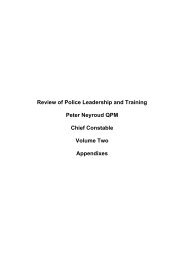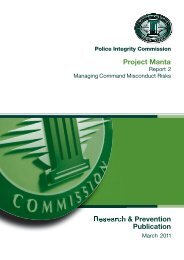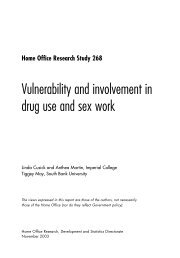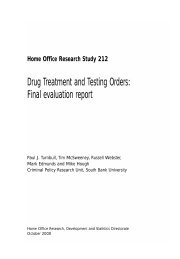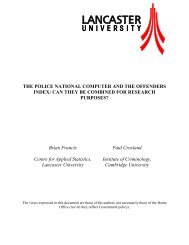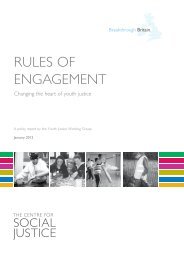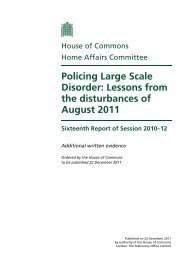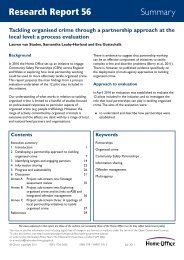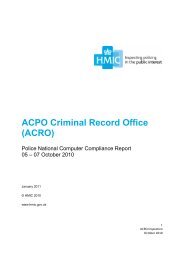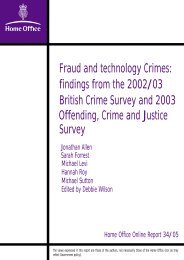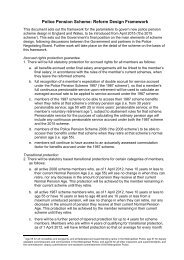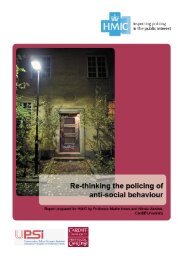Reducing Bureaucracy in Policing - Home Office
Reducing Bureaucracy in Policing - Home Office
Reducing Bureaucracy in Policing - Home Office
You also want an ePaper? Increase the reach of your titles
YUMPU automatically turns print PDFs into web optimized ePapers that Google loves.
Introduction<br />
Executive Summary<br />
Sir Ronnie Flanagan likened bureaucracy to cholesterol; there is both good and bad. The police<br />
service is accountable and records need to be kept. Some bureaucracy, enough to run an efficient<br />
and effective police service is necessary, but extra layers of bureaucracy have been created to<br />
meet the demands of scrut<strong>in</strong>y and quality assurance, <strong>in</strong> times when budgets are be<strong>in</strong>g cut, the<br />
question needs to be asked, what is affordable?<br />
Where the requirement to record becomes more important than the<br />
quality of the <strong>in</strong>vestigation, the balance is wrong. And when quality<br />
assurance is more about comply<strong>in</strong>g with a set of rigid rules than<br />
achiev<strong>in</strong>g a successful outcome the balance is also wrong. The checks<br />
should not outweigh the balances.<br />
Recognition of the negative impact excessive bureaucracy creates has long been understood.<br />
Previous Chief Inspectors of Constabulary, Sir David O'Dowd and Sir Ronnie Flanagan both made<br />
a series of recommendations aimed at reduc<strong>in</strong>g unnecessary bureaucracy and prepared costed<br />
bus<strong>in</strong>ess plans for change. The reports received considerable support across polic<strong>in</strong>g and<br />
government, a great deal of enthusiasm and energy was expended and some progress made,<br />
(procurement, call handl<strong>in</strong>g, remote access to <strong>in</strong>formation, ethical crime record<strong>in</strong>g, alternatives to<br />
arrest, workforce mix, collaboration, partnerships). But improvements have not been fully<br />
implemented or embedded across all forces, they are not deliver<strong>in</strong>g the anticipated or potential<br />
benefits and front l<strong>in</strong>e officers rema<strong>in</strong> frustrated at the lack of trust and amount of duplicated effort<br />
and waste they experience on a daily basis.<br />
This is my fourth and F<strong>in</strong>al Report; an Interim Report published <strong>in</strong> February 2009 highlighted the<br />
need to focus on the causes of bureaucracy rather than symptoms, my Full Report published <strong>in</strong><br />
December 2009 proposed long term cultural change and the adoption of cont<strong>in</strong>uous improvement<br />
pr<strong>in</strong>ciples alongside shorter term process change to remove duplication and waste. A further report<br />
focuss<strong>in</strong>g on bureaucracy <strong>in</strong> Crim<strong>in</strong>al Justice Units was published <strong>in</strong> March 2010.<br />
Over the last two years I have visited most police forces throughout England & Wales and met with<br />
chief officers, senior managers and front l<strong>in</strong>e officers. I have sought to identify progress made and<br />
to understand why, when so much is be<strong>in</strong>g done <strong>in</strong> the name of reduc<strong>in</strong>g bureaucracy, has so little<br />
of it got the necessary traction to deliver the anticipated benefits and necessary change. In<br />
particular I have sought to identify what would unlock the apparent gridlock and deliver the much<br />
needed benefits.<br />
Unnecessary bureaucracy builds up and is often the accumulation of well mean<strong>in</strong>g, isolated and<br />
poorly coord<strong>in</strong>ated projects and <strong>in</strong>itiatives. Listen<strong>in</strong>g to hundreds of front l<strong>in</strong>e officers, you can<br />
count on one hand those who report an overall reduction <strong>in</strong> bureaucratic demand, with old<br />
bureaucracy quickly replaced by new demands for data and <strong>in</strong>formation. On the positive side and<br />
despite the number of false starts, the enthusiasm to get to grips with bureaucracy and remove the<br />
over-eng<strong>in</strong>eer<strong>in</strong>g, duplication and waste rema<strong>in</strong>s.<br />
Numerous improvements have been made, but these are quickly absorbed <strong>in</strong>to 'normal bus<strong>in</strong>ess'<br />
and the benefits may not be fully appreciated. That said, government and polic<strong>in</strong>g need to better<br />
understand what has prevented the anticipated benefits be<strong>in</strong>g realised.<br />
1



